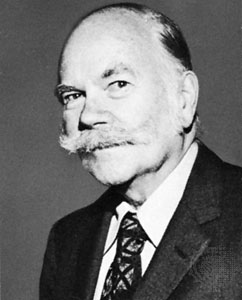

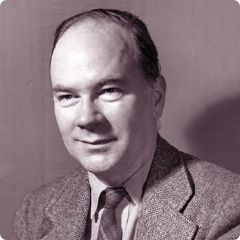 OL: Well, I’m a pretty good conductor, you know.
I did a lot of operas including the premieres of Menotti’s Medium and Virgil Thomson’s Mother of us All. Under the circumstances,
I felt that I probably did many things better than the other guy would have
done. On the other hand, it was a fatiguing experience, because I had
to see that it went on as a premiere. I had to oversee everything,
and so on and so forth. I think your question is good, and difficult
to answer. It depends. I think Richard Strauss, for instance,
was very good in conducting his own things. Other composers that I’ve
worked with included Ermanno Wolf-Ferrari. I played his Le Donne Curiose under his direction,
and he wasn’t so good. So I think it’s an open question. It depends
on the guy; it depends on the person.
OL: Well, I’m a pretty good conductor, you know.
I did a lot of operas including the premieres of Menotti’s Medium and Virgil Thomson’s Mother of us All. Under the circumstances,
I felt that I probably did many things better than the other guy would have
done. On the other hand, it was a fatiguing experience, because I had
to see that it went on as a premiere. I had to oversee everything,
and so on and so forth. I think your question is good, and difficult
to answer. It depends. I think Richard Strauss, for instance,
was very good in conducting his own things. Other composers that I’ve
worked with included Ermanno Wolf-Ferrari. I played his Le Donne Curiose under his direction,
and he wasn’t so good. So I think it’s an open question. It depends
on the guy; it depends on the person.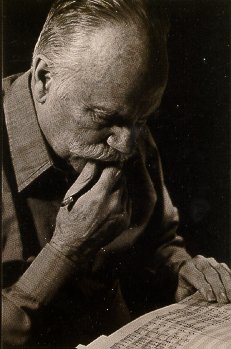 OL: Well, I don’t know. Let me continue along
those lines, because it’s staggering figures, you see. It certainly
runs into maybe eight hundred and fifty orchestras. They’re all community
orchestras and student orchestras, and all. That’s the orchestra side.
In 1930, Claire Reis published her book American Composers, and I believe she
had fifty names of what she called real composers — that’s concert composers,
not including pop. Fifty. Add to that another hundred and fifty
who wrote short pieces, and you had, in the 1930s, two hundred composers.
The most recent count has now mushroomed, because our educational system
has been pretty good, and we now have a minimum of fifteen thousand composers
of concert music. Gunther Schuller estimated
it was thirty thousand people who are literate and write orchestra scores.
So there’s the question that you brought up, is this too many? Aren’t
there too many composers? That depends on whether our society knows
how to absorb them. If you’re going to pile them all into Chicago and
New York, it’s certainly too many. But if the regions and the states
take a bit of local pride and take care of their talent and pay for it, it’s
not too many. It just means there’s just a strange democratic outburst
of talent, of which we can be very proud. I think the quality is enormously
high since the twenties, and the mass is enormous and surprising. That’s
a very fast development, but I don’t know whether our audiences can handle
it yet.
OL: Well, I don’t know. Let me continue along
those lines, because it’s staggering figures, you see. It certainly
runs into maybe eight hundred and fifty orchestras. They’re all community
orchestras and student orchestras, and all. That’s the orchestra side.
In 1930, Claire Reis published her book American Composers, and I believe she
had fifty names of what she called real composers — that’s concert composers,
not including pop. Fifty. Add to that another hundred and fifty
who wrote short pieces, and you had, in the 1930s, two hundred composers.
The most recent count has now mushroomed, because our educational system
has been pretty good, and we now have a minimum of fifteen thousand composers
of concert music. Gunther Schuller estimated
it was thirty thousand people who are literate and write orchestra scores.
So there’s the question that you brought up, is this too many? Aren’t
there too many composers? That depends on whether our society knows
how to absorb them. If you’re going to pile them all into Chicago and
New York, it’s certainly too many. But if the regions and the states
take a bit of local pride and take care of their talent and pay for it, it’s
not too many. It just means there’s just a strange democratic outburst
of talent, of which we can be very proud. I think the quality is enormously
high since the twenties, and the mass is enormous and surprising. That’s
a very fast development, but I don’t know whether our audiences can handle
it yet.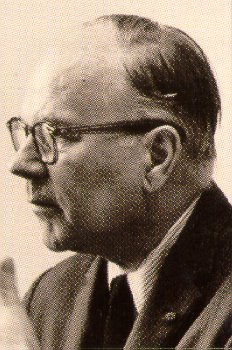 OL: These things go in different ways. One
of the things that happens, that I’ve noticed for sure, is that if you hear
things over and over again, it’s like in agriculture; you get soil erosion.
In music or other cultural things, repetition causes cultural erosion.
You have to have forces of renewal, and history bears me out on that.
At some point there always has to be the injection of a new experience to
keep the thing rolling. Hollywood knows that, because they’ll watch
with great interest, and at a certain point they filter in and filter out
what they can use in the way of new rhythms and new sounds and new timbres,
and they use it and sell it. It’s perfectly okay. But what is
needed is the acceptance of research and development in music. Research
and development — we understand what that means in industry and in the stock
market. Venture capital — we understand what that means. Exploration
— we understand what that means in the oil field. Well, it exists in
music, too, and you need that. You need explorers, you need experimenters
to find the pay dirt. We have little feeling that we can buy it and
conserve it and keep it. We have that feeling from time to time, but
it never lasts; it changes. I think we’re now on the move. The
symphonic repertory is going to pick up because they’ve got these young composers-in-residence
now with several of the big orchestras.
OL: These things go in different ways. One
of the things that happens, that I’ve noticed for sure, is that if you hear
things over and over again, it’s like in agriculture; you get soil erosion.
In music or other cultural things, repetition causes cultural erosion.
You have to have forces of renewal, and history bears me out on that.
At some point there always has to be the injection of a new experience to
keep the thing rolling. Hollywood knows that, because they’ll watch
with great interest, and at a certain point they filter in and filter out
what they can use in the way of new rhythms and new sounds and new timbres,
and they use it and sell it. It’s perfectly okay. But what is
needed is the acceptance of research and development in music. Research
and development — we understand what that means in industry and in the stock
market. Venture capital — we understand what that means. Exploration
— we understand what that means in the oil field. Well, it exists in
music, too, and you need that. You need explorers, you need experimenters
to find the pay dirt. We have little feeling that we can buy it and
conserve it and keep it. We have that feeling from time to time, but
it never lasts; it changes. I think we’re now on the move. The
symphonic repertory is going to pick up because they’ve got these young composers-in-residence
now with several of the big orchestras. 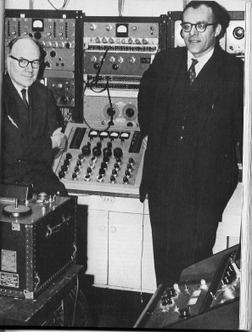 BD: Thirty years ago, electronics were the outer
reaches of music. What are the outer reaches of music now?
BD: Thirty years ago, electronics were the outer
reaches of music. What are the outer reaches of music now?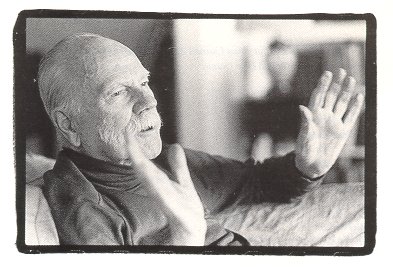 OL: I think so. We’re on the way toward it
because we’ve got a lot of opera workshops that are doing these things in
scenes, and I think it’s ready now to take off. I had a funny experience
with my own opera Evangeline.
I did it and I got a very good review from Virgil Thomson and some others
back in the forties. Then it goes along and it was done on the radio
a little bit, and another production here and there, and then it goes to
sleep. This was a long time ago. Then all of a sudden I had a
piece played here in New York, my Fantasia
for Orchestra. Slatkin conducted the
American Composer’s Orchestra and I get a review in the New Yorker from Andrew Porter, who was
interested in opera. He writes that I’m a pretty good composer.
He was very nice about the whole thing, and then he says, “Isn’t it time
to revive Luening’s opera, Evangeline?
Virgil Thomson thinks very highly of it.” Well, that was enough of
a plug to get people to look at the score. It’s published by Peters,
and by Jove, the After Dinner Opera Company gave concert performances of
it! They did one in Lincoln Center and one in Queensborough College.
I hurt my back so I couldn’t go, but the houses were packed and it was a
great public success! It got a very good review from Tim Page, who
said about one of the choral scenes, “This is one of the best
choral pieces ever written in this country.” He said everybody ought
to be doing it. So what happened from that is I think they’re going
to do another concert performance of it here next year. I just had
a call from somebody. So you see, it’s funny, how this works.
OL: I think so. We’re on the way toward it
because we’ve got a lot of opera workshops that are doing these things in
scenes, and I think it’s ready now to take off. I had a funny experience
with my own opera Evangeline.
I did it and I got a very good review from Virgil Thomson and some others
back in the forties. Then it goes along and it was done on the radio
a little bit, and another production here and there, and then it goes to
sleep. This was a long time ago. Then all of a sudden I had a
piece played here in New York, my Fantasia
for Orchestra. Slatkin conducted the
American Composer’s Orchestra and I get a review in the New Yorker from Andrew Porter, who was
interested in opera. He writes that I’m a pretty good composer.
He was very nice about the whole thing, and then he says, “Isn’t it time
to revive Luening’s opera, Evangeline?
Virgil Thomson thinks very highly of it.” Well, that was enough of
a plug to get people to look at the score. It’s published by Peters,
and by Jove, the After Dinner Opera Company gave concert performances of
it! They did one in Lincoln Center and one in Queensborough College.
I hurt my back so I couldn’t go, but the houses were packed and it was a
great public success! It got a very good review from Tim Page, who
said about one of the choral scenes, “This is one of the best
choral pieces ever written in this country.” He said everybody ought
to be doing it. So what happened from that is I think they’re going
to do another concert performance of it here next year. I just had
a call from somebody. So you see, it’s funny, how this works.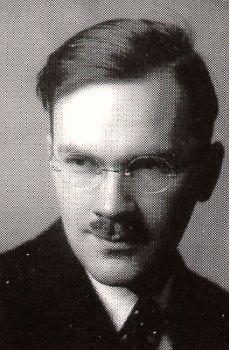 OL: No, I don’t feel it. With some pieces you
do, but this one I think is a very cheerful piece; it’s all right.
On that same record there’s another one that is interesting, the Symphonic Fantasia, my first one.
I wrote that in Chicago, in 1922 or ’23, somewhere
in there. There was a famous theoretician in Chicago by the name of
Bernard Ziehn, who’s since been forgotten, but he’s now being discovered
again. Ziehn had a great influence on the musical life of Chicago.
He was a friend of Theodore Thomas. He was a friend of Frederick Stock
and had an influence on Stock. He had an influence on Wilhelm Mittelschule,
the great organist. He had an influence on Ferruccio Busoni and Busoni’s
whole influence. The whole Chicago group was influenced by this German
theoretician. When I came to Chicago in the twenties, I went to Mittelschule.
Ferruccio Busoni told me, “You ought to go and see Mittelschule. He’s
a great musician.” I went to Mittelschule and I asked him if I could
learn from him Ziehn’s theoretical background. I studied with him for
six months. Mittelschule played my organ music brilliantly when I was
just a kid, and then I wrote this piece. It was influenced very much
by this theoretical background of Ziehn, but it’s cunningly concealed because
it sounds good, you know. It sounds like a regular orchestra piece.
It’s only eight minutes long. What happened now is that it was also
recorded by the Vienna Symphony, and it got played around a bit over stations
like yours. The younger generation, the present generation, have discovered
that piece and all of a sudden they say, “How did you ever write that kind
of piece in 1922?” And I say, “I don’t know. What is it?”
“Well, it appeals to us. We like it,” and so on. These are young
kids. Now it’s been analyzed very carefully by this brilliant young
musicologist Severine Neff, and that’s going to be presented at the Theory
Seminar in Vancouver, along with some other music of mine that I did around
that time. This is strange, but it has to do with Chicago and Milwaukee,
and that regional thing that I’m talking about because this guy Ziehn was
a great theorist who happened to land in Chicago, where he taught, among
other people, John Alden Carpenter. He also was the piano teacher.
He made his living teaching piano, and he taught Mrs. Rockefeller McCormick’s
children and other children of the wealthy people there. A very interesting
man! Forgotten, but now suddenly rediscovered by a younger generation
that comes along.
OL: No, I don’t feel it. With some pieces you
do, but this one I think is a very cheerful piece; it’s all right.
On that same record there’s another one that is interesting, the Symphonic Fantasia, my first one.
I wrote that in Chicago, in 1922 or ’23, somewhere
in there. There was a famous theoretician in Chicago by the name of
Bernard Ziehn, who’s since been forgotten, but he’s now being discovered
again. Ziehn had a great influence on the musical life of Chicago.
He was a friend of Theodore Thomas. He was a friend of Frederick Stock
and had an influence on Stock. He had an influence on Wilhelm Mittelschule,
the great organist. He had an influence on Ferruccio Busoni and Busoni’s
whole influence. The whole Chicago group was influenced by this German
theoretician. When I came to Chicago in the twenties, I went to Mittelschule.
Ferruccio Busoni told me, “You ought to go and see Mittelschule. He’s
a great musician.” I went to Mittelschule and I asked him if I could
learn from him Ziehn’s theoretical background. I studied with him for
six months. Mittelschule played my organ music brilliantly when I was
just a kid, and then I wrote this piece. It was influenced very much
by this theoretical background of Ziehn, but it’s cunningly concealed because
it sounds good, you know. It sounds like a regular orchestra piece.
It’s only eight minutes long. What happened now is that it was also
recorded by the Vienna Symphony, and it got played around a bit over stations
like yours. The younger generation, the present generation, have discovered
that piece and all of a sudden they say, “How did you ever write that kind
of piece in 1922?” And I say, “I don’t know. What is it?”
“Well, it appeals to us. We like it,” and so on. These are young
kids. Now it’s been analyzed very carefully by this brilliant young
musicologist Severine Neff, and that’s going to be presented at the Theory
Seminar in Vancouver, along with some other music of mine that I did around
that time. This is strange, but it has to do with Chicago and Milwaukee,
and that regional thing that I’m talking about because this guy Ziehn was
a great theorist who happened to land in Chicago, where he taught, among
other people, John Alden Carpenter. He also was the piano teacher.
He made his living teaching piano, and he taught Mrs. Rockefeller McCormick’s
children and other children of the wealthy people there. A very interesting
man! Forgotten, but now suddenly rediscovered by a younger generation
that comes along.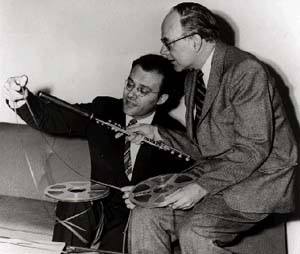 OL: Oh, yes. We used the electronic tape in
the Rhapsodic Variations. It
was the first piece of its kind, actually, that was performed publicly.
We used piano and flute as a sound source. I played the flute myself,
and we used the tape part like a section of the orchestra — percussion,
tape, woodwinds, brass, and so on. But we used it somewhat differently
than Varèse did it in his Déserts.
We blended it with the other sections. Sometimes it would play with
the strings, sometimes it would be solo or do a cadenza in and out, but not
like a concerto grosso. It wasn’t just the tape and then the orchestra
and then the tape and then the orchestra, but it was blending it and mixing
it with strings and sometimes the woodwinds.
OL: Oh, yes. We used the electronic tape in
the Rhapsodic Variations. It
was the first piece of its kind, actually, that was performed publicly.
We used piano and flute as a sound source. I played the flute myself,
and we used the tape part like a section of the orchestra — percussion,
tape, woodwinds, brass, and so on. But we used it somewhat differently
than Varèse did it in his Déserts.
We blended it with the other sections. Sometimes it would play with
the strings, sometimes it would be solo or do a cadenza in and out, but not
like a concerto grosso. It wasn’t just the tape and then the orchestra
and then the tape and then the orchestra, but it was blending it and mixing
it with strings and sometimes the woodwinds.
|
This interview was recorded on the telephone on July 20, 1985.
Portions were used on WNIB (along
with musical examples) on six occasions between 1986 and 2000. A copy
of the unedited interview was given to the Archive of Contemporary Music
at Northwestern University. The transcription was made in 2008 and
posted on this website in December of that year.
To see a full list (with links) of interviews which have been transcribed and posted on this website, click here. To read my thoughts on editing these interviews for print, as well as a few other interesting observations, click here.
Award - winning broadcaster Bruce Duffie was with WNIB, Classical 97 in Chicago from 1975 until its final moment as a classical station in February of 2001. His interviews have also appeared in various magazines and journals since 1980, and he now continues his broadcast series on WNUR-FM, as well as on Contemporary Classical Internet Radio.
You are invited to visit his website for more information about his work, including selected transcripts of other interviews, plus a full list of his guests. He would also like to call your attention to the photos and information about his grandfather, who was a pioneer in the automotive field more than a century ago. You may also send him E-Mail with comments, questions and suggestions.